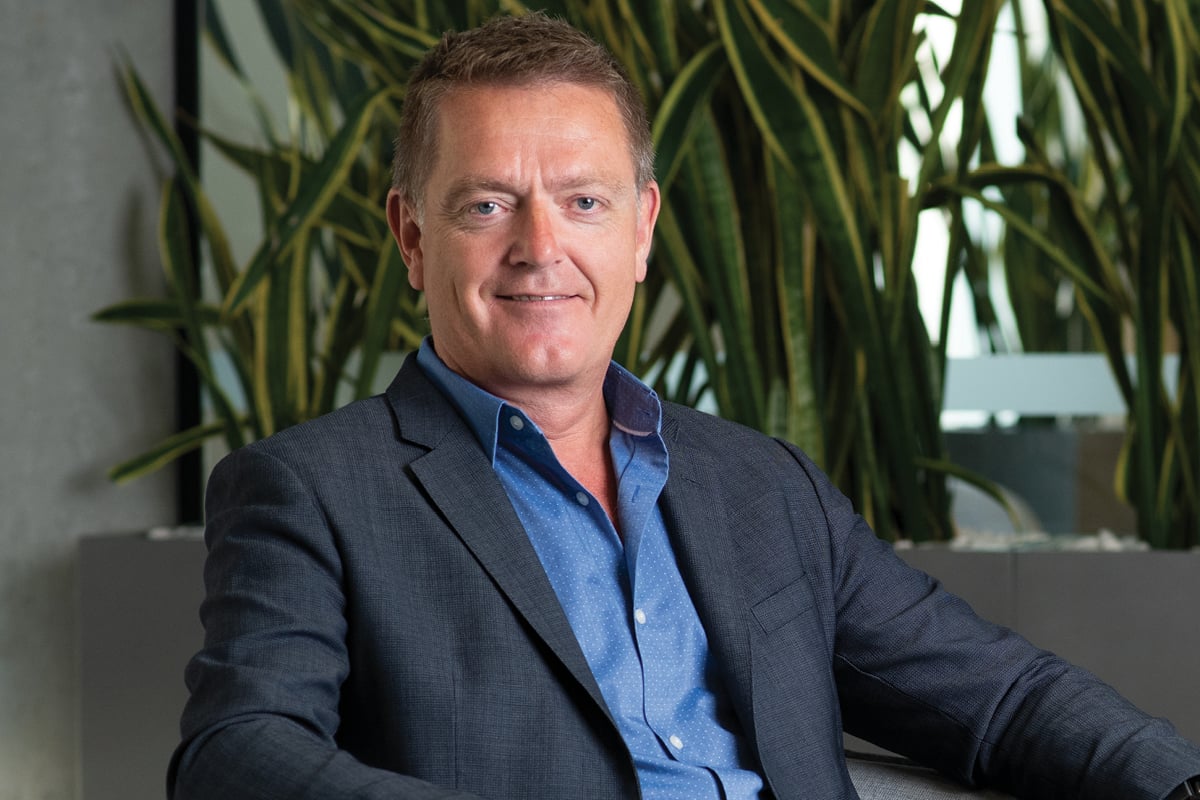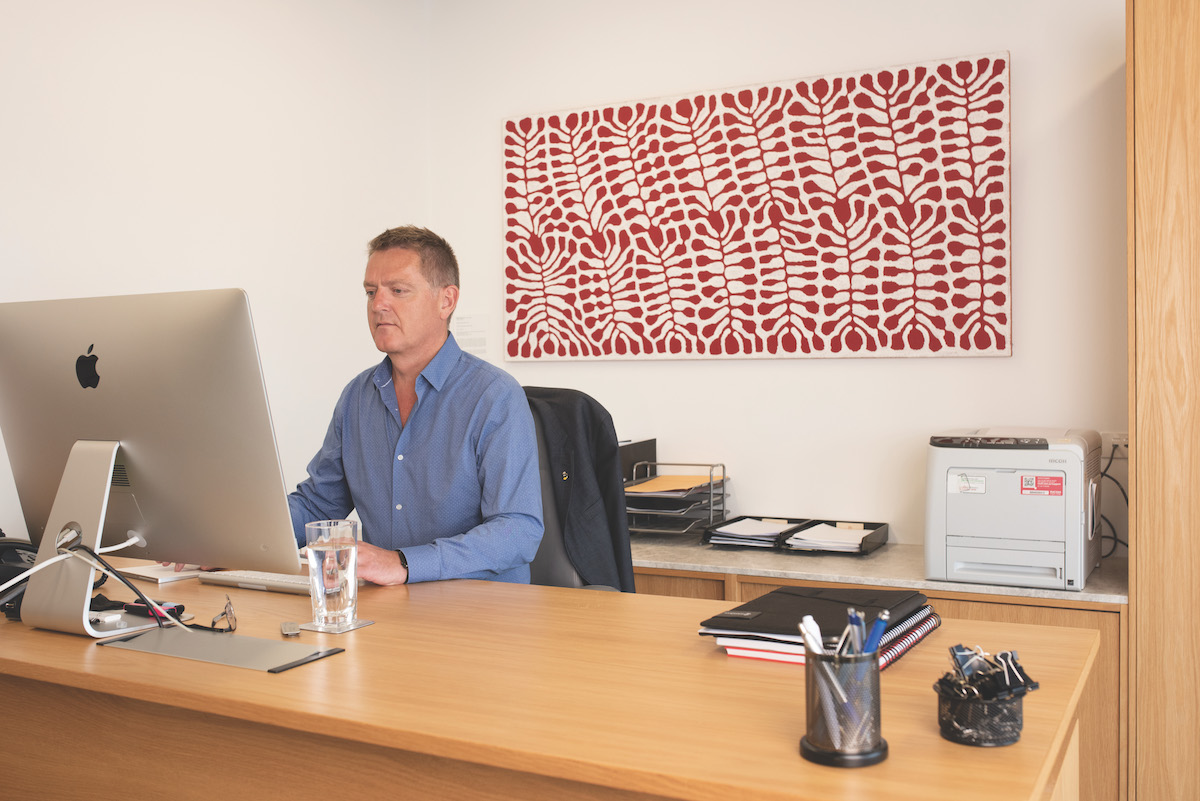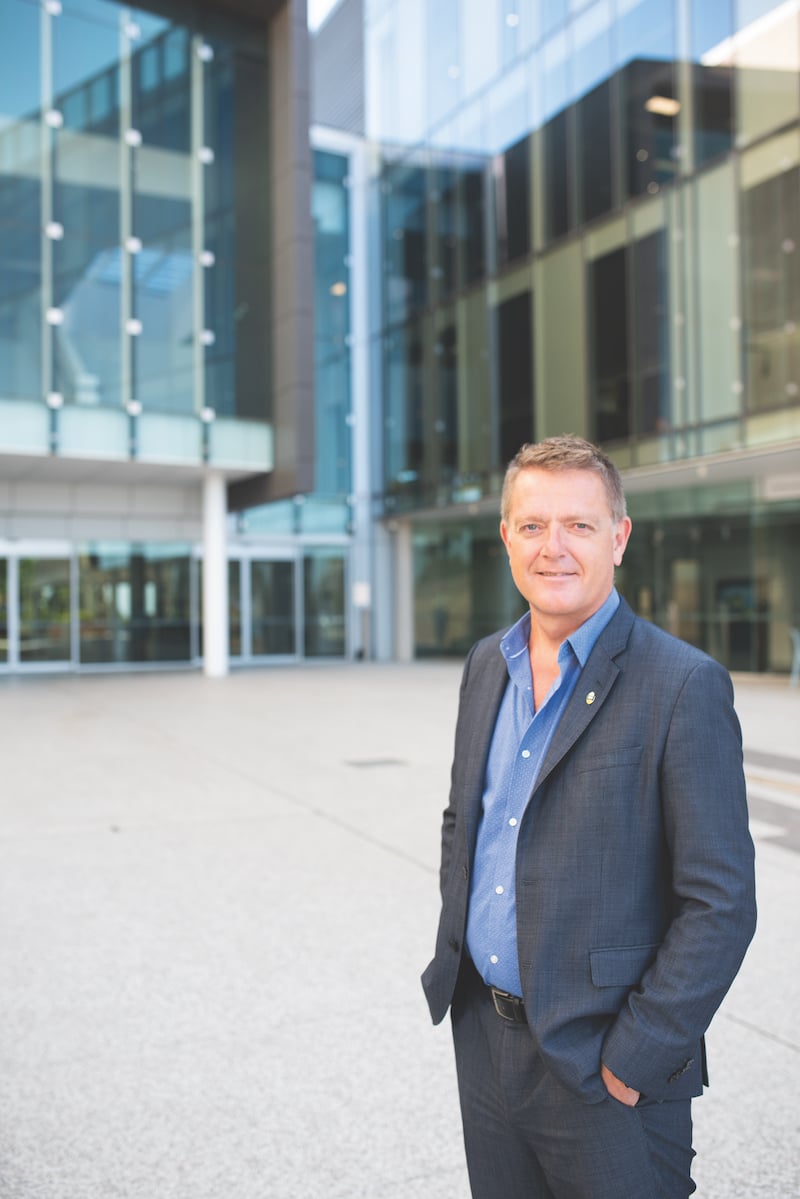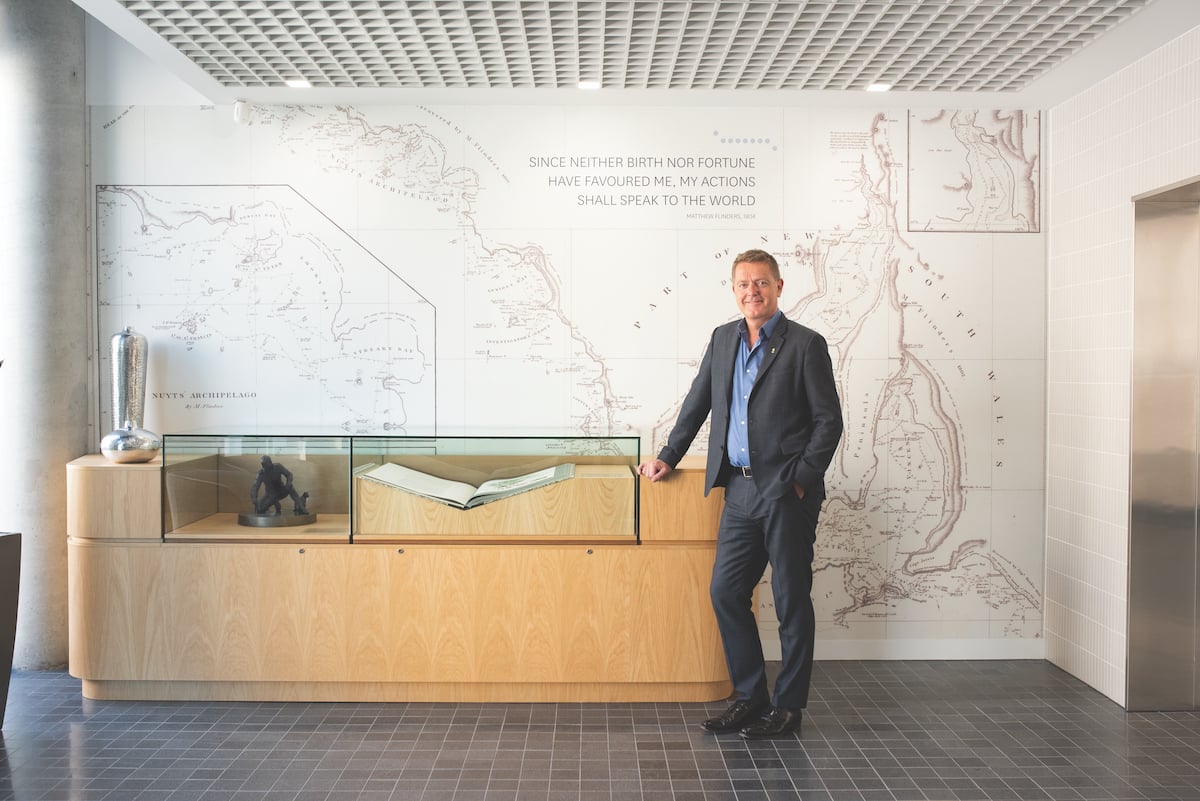Whether it was the view outside his window in Manchester or the Perth weather forecast is not really that important, as these things go, but they certainly were an influence, as Colin tells it. He was, he says, in a reflective mood when he was made an offer too good to refuse, so he packed up his family to pursue a career on the other side of the world. It was, in retrospect, the right move, he confirms.

“I got a call one day asking if I was interested in the idea of a job in Perth, and I have to confess that part of the motivation was looking out my window at the Manchester weather and then the weather charts in Perth, and I have to say there was a certain attractiveness to the Australian climate. But, in fairness, the other incentive was I’d got involved in the leadership at Manchester Uni as vice-president, but still doing my regular professor’s job,” he recalls.
“I was doing them both and I realised that I ought to make a decision and do one or the other as well as I possibly could. An option came up at Curtin University just as I was thinking those thoughts, and it looked like a really interesting opportunity, so I couldn’t resist.”
Colin and his young family made the move to Perth, where he took on the role of Deputy Vice-Chancellor Academic at Curtin University in 2011. Then in 2015, they moved again to South Australia when Colin accepted the role of President and Vice-Chancellor of Flinders University in Adelaide.
Colin has built a stellar academic career. He gained a Bachelor of Science in Biological Sciences from the University of Edinburgh, then completed a PhD in genetics at the University of Glasgow. He held a NATO Research Fellowship at the University of California, Berkeley, before accepting an appointment at the University of Manchester in 1990. From 1998–2011, he was Professor of Genetics at Manchester, and took on managerial positions including Education Dean in the Faculty of Life Sciences, Associate Vice President e-learning, and Vice President for Teaching and Learning.
“I was an academic for a very long time,” he says, looking back. “I was a professor of genetics at Manchester, where I was lucky enough to benefit from the many opportunities that came my way in both research and teaching, and then I moved to what my colleagues would describe as the ‘dark side’ when I took a role in university leadership. I’ve reflected on the reasons why I did this and realised that I’d got bored sitting around with my colleagues complaining about how the place was so badly run. I therefore decided that I had to either put up or shut up. So I got involved and found that I enjoyed the strategic challenges, and thus began my second career.”
Smoothing the course
His decision to take on the role at Flinders University in 2015 was based on his view that Flinders was filled with potential, Colin says, because it was an institution that had “relaxed a little. It was an absolute powerhouse back in the 80s and 90s, and I saw a huge amount of potential that was just waiting to be mobilised again, and I couldn’t resist.”
Colin came to the conclusion that Flinders University was struggling partly because of its academic structure, and so launched a major program to streamline its operations. While this program was met with some resistance, it was completed in early 2019, and has remodelled the academic format to simplify the study paths open to students.
“Universities are notoriously bureaucratic organisations, and get blocked up. It’s like a calcification, or a fossilisation process,” he suggests. “The systems and processes get embedded and nobody can quite remember why things are done as they are. This requires a transformational cultural shift and a simplified structure can help. We removed an unnecessary layer of bureaucracy by condensing two layers of academic units into one. The new structure comprises six colleges that each bring together a new combination of academic disciplines that were previously isolated in siloes.

“It sounds trivially simple, but the importance of breaking down siloes cannot be overstated. By putting disciplines together in one unit we’ve removed the budgetary boundaries between them and encouraged people to collaborate with one another more easily. For example, we’ve combined the disciplines of education, psychology and social work. There’s no similar combination of those disciplines in any university that I know of, but those three inherently related disciplines now have researchers working together to develop interdisciplinary solutions to complex problems. It’s a win–win for the university in research and in teaching.”
“The importance of breaking down siloes cannot be overstated.”
Colin is encouraged that Flinders University is becoming a more agile organisation as a consequence of relatively simple structural changes, and has observed a change in the mindset of its staff. “Rather than just looking internally, they are actually looking outward and interdisciplinarity is absolutely the key to solving complex problems. That’s nurturing an appetite for collaborative work, and we’re now seeing those different colleges and their staff looking between the colleges to find other interdisciplinary opportunities. It’s very important to us,” he points out.
“The principle was that students now have access to interdisciplinary teaching – in other words, greater levels of expertise in related areas that can then enhance their educational experience. That means that students have a wider range of options and more expertise available to them, and that’s also a win–win.”
The result is the university can create new programs more rapidly than before to respond to growing needs. It’s no more evident than in South Australia’s need for new skillsets with the development of the defence industry, with naval shipbuilding requirements for submarines and frigates. Upskilling the workforce is required for those projects to succeed, and to meet the longer term needs of Australian industry. He also wants to meet the needs of students so they have greater potential to be successful in their future careers, whatever they are.
“We want to develop graduates with the skills needed to succeed in tomorrow’s workplace, not in yesterday’s workplace. And that means ever more contemporary education. It’s a real challenge but, of course, it’s an exciting one, and it’s one that we’re rising to.”
In his eight years in Australian academe, Colin has observed the increasingly international nature of tertiary education, and Australia’s reliance on it both economically and as an enabler for its youth. Australia performs well, he says, but is capable of doing more.
“We need, as a nation, to make sure that our young people are educated sufficiently to be competitive in an increasingly globalised workforce. I think that’s what’s important. Our graduates need to be able to compete in an international workforce in the future. In 2018, Australian universities produced around 370,000 graduates, but this compares to more than eight million graduating every year in China. That’s more than the population of Hong Kong every year. Indeed, China now has a higher 24-year-old participation rate than Australia.
“We need, as a nation, to make sure that our young people are educated sufficiently to be competitive in what is an increasingly globalised workforce.”
“So it’s not just a scale issue; yes, their population is much larger, but they have a higher percentage of young people being skilled up for the future workforce. I want my kids and all Australian kids to get the same opportunities. It’s good for them, but it’s also good for the economic future of the country.”
Colin finds significant personal reward in his managerial role, although it has a different outcome to his earlier roles as a teacher and researcher. It boils down to making a difference, he says.
“I’d realised over time that one of my most deeply rooted values is to make a difference, and my academic career satisfied that. In research, one makes a difference through new discoveries that add to human knowledge. In teaching, one can make a difference to people’s lives through their education, hopefully inspiring them to go on to greater things. As a leader, I now seek to make a difference by enabling other people, creating the environment in which their research and teaching can flourish, and that’s a far greater impact overall than I could ever have achieved as an individual academic. I do find that very rewarding.”
At a glance: Colin Stirling’s awards
- 1988-1990 – Nato Research Fellowship
- 1993-1998 – Jenner Research Fellowship from the Lister Institute of Preventative Medicine
- 1997 – Fleming Prize Lecture from the Microbiology Society
- 1998 – Balfour Prize from the Genetical Society
- 2005 – University of Manchester Distinguished Achievement Medal, Researcher of the Year
- 2006-2011 – Royal Society Wolfson Research Fellowship
Flinders University is ranked internationally at 271, which, Colin is quick to point out, is the highest the university has ever achieved. He adds that this ranking puts the university in the top 1.1% of universities worldwide. With increasing revenue and higher student numbers – currently at about 27,000 – the university is growing in both size and prestige.
“We’re on the cusp of the top 1% globally, and very comfortably inside the top 2%. That’s an important measure of success, and demonstrates that we’re on the right strategic path. But you can’t do anything without money, and so crucially we’ve grown revenues by 20% in the past few years, and have broken the half billion dollars a year mark,” he beams.
International student education is a phenomenal success story in Australia, worth about A$37.6 billion a year as an export industry.
“That’s a top two or three industry in the country, depending on the iron ore price,” says Colin, whose expertise in international education saw him appointed as a Non-Executive Director of the IDP Ltd, an ASX200 company dedicated to international student placements and high-stakes English language testing. IDP’s current A$4.8 billion market capitalisation has grown significantly in recent years, and reflects the increasing global importance of university education.
Flinders’ international student numbers account for about 13% of its student population, which is currently lower than the typical 20% at many other Australian universities. So Colin is confident Flinders University has room to grow. He considers international students an integral part of the university’s population, as they bring with them cultural, academic and social benefits beyond measure.
“We often read stories in the press that suggest that this is all just a financial transaction somehow, that it’s all just being done for the money. Not true. I met a group of our international students just last week to congratulate them on some awards they’d won and, I have to say, it was inspirational. This was a group of students from all over the world, so articulate, all with a fascinating story to tell about themselves, but they all absolutely love Flinders University and they love Adelaide, South Australia and Australia. They will go home, where they will become the best ambassadors this country could ever have. This is absolutely soft diplomacy at its very best,” he enthuses.
“They will go home, and they are going to be the best ambassadors this country could ever have. This is absolutely soft diplomacy at its very best.”
Building a village
Flinders University was recently dealt a winning hand with the announcement of a joint federal and state government initiative to build a railway station with A$141 million of government funds, to be located next to the university, attracting more students to live at the university as its strategic plan comes to fruition with Flinders Village, a major development around the new station.

The Village, a A$1.5 billion development at the university’s Bedford Park campus, will reportedly create the largest integrated health and education precinct in South Australia. It will contain student accommodation, a health research facility and private hospital, transitional health accommodation, a hotel, and amenities such as retail facilities.
The first stage of the project, the health research building, will have a focus on mental health and infectious diseases. Accommodation will be provided for rural and regional patients and their families while they visit the medical centre and private hospital, and student residential spaces will be increased to accommodate more regional and international students who choose to live at the campus. The project will also deliver retail space for shops, restaurants, cafes and bars, sports facilities for locals, and extra car parking for people visiting the village.
In addition to its own investment in the village, the university will be inviting public and private partners to contribute to developing Flinders Village. “The village is a plan we’ve developed to leverage an investment in the train connection that’s coming to the university,” explains Colin.
“What we’re going to do is develop a combination of things around the train station, including student accommodation, but also research and teaching facilities, some mixed-use facilities, and some commercial, retail and lifestyle venues. The idea is to create a vibrant hub for students who are living on campus – something that gives them a lifestyle opportunity when they’re not at the university as such.
“But it’s also an integration of the university with our community more broadly, because this is a place that will be open to the public and to the local hospital. It’ll bring the community and the university closer together. I think it’s going to be very exciting in building the university’s place here in southern Adelaide,” he explains.
“We are a university built in the 1960s, and as was often the case, both in Australia and elsewhere in the UK and Canada, universities built then tended to be built as campuses just outside the edge of town – a sort of semi-rural and isolated campus environment.
“And of course, in the 50 years since, most of the cities have grown towards the universities, but the integration hasn’t necessarily taken place. I think it’s important to make our university community accessible to, and part of, the local community. It simply grows vibrancy around the campus and gives that sense of place, that sense of atmosphere that people thrive on these days.”
Flinders Village will, according to independent research, attract perhaps 5,000 more international students to Adelaide, improve accommodation with an extra 3,000 student beds and boost South Australia’s annual education export earnings by about A$125 million. During its development, more than 10,000 construction ‘job years’ will be created.
The university has some form in developing new facilities. It has in recent years developed an innovation campus at Tonsley, about a kilometre from the main campus. The site is the former Mitsubishi car plant, which closed in the mid-2000s when the company vacated the Australian vehicle manufacturing industry. The university has built an engineering science facility, which has attracted numerous companies, a collection of startups and SMEs, and now several multinational corporations.
“Our researchers and students are working side by side now with various innovative companies,” Colin says. “It’s creating a real buzz and a vibrant atmosphere. And I’m told there are now more people working at the Tonsley site than when Mitsubishi was building cars there. It’s a terrific success, and the university is absolutely at the heart of that regeneration and that success.
“We’re developing in a number of areas. One key area for us is advanced manufacturing. This has implications and opportunities effectively right through manufacturing.
“This is Industry 4.0, advanced materials, nanoscale materials, medical devices, and we’re working with those in areas such as the defence industries, potentially in future with the new space agency that’s going to be based here in Adelaide, and a lot in the medical devices field.
“We’ve got some world-class medical device research and development going on here that is helping to create and build high-tech businesses in South Australia that are tapping into a multibillion-dollar global industry. They are really important areas that all feed into the modern world of manufacturing and create opportunities for the workforce of the future.”
This advanced manufacturing expertise is important to Australia because of the many small- and medium-sized enterprises in Adelaide – and Australia – and engaging with them to embrace Industry 4.0 technologies in their own businesses can only lead to greater things for them and the country as a whole. The collaboration is going well, says Colin, and it means that those SMEs will then be able to connect into global supply chains. That is, he considers, such a huge opportunity, and one that Flinders University is very keen to help to capitalise on.

The education imperative
Through these initiatives Flinders University is able to stand on its own feet to an extent, but federal funding maintains the university’s equilibrium. That funding is an invaluable investment in the future, says Colin.
“Education is expensive, and universities are generously funded by the Australian taxpayer and through student fees. We must never forget this, and it is important that we spend our money wisely and squeeze every bit of value in every single dollar.
“That said, as a nation we need to see that education is crucial to our future. We should view it less as a burdensome cost and much more clearly as an essential investment, because without that investment in our education system nationally – and I mean at all levels, in primary school, secondary school, TAFE, universities – our nation simply cannot be competitive into the future.”
Colin finds academic life in Australia more informal than in his homeland, and enjoys that aspect enormously, especially at Flinders University. “What do I love about Flinders University? It happened to me twice today as I went out to buy my sandwich on campus. People just wave, smile and say, ‘Hi, Colin, how are you doing today?’ I love that Aussie informality. If I were still in the UK it would be, ‘Good afternoon, Vice-Chancellor,’ and I’d probably even have to wear a tie.”
Of course, it hasn’t all been plain sailing, and Colin has taken some flak from a union opposed to his modernisation agenda. He is pretty sanguine about this and accepts it as part of the job. “You’ve got to do the right thing and not necessarily always the popular thing.”
The Stirling family are now Australian citizens, and have happily adapted to the Australian lifestyle. His children even have Aussie accents, he says, counterbalancing his own softened Scottish burr.
“In the winter, I complain about the South Australian weather because I find it a bit cold. People always say to me, ‘But Colin, you’re from Scotland; how can you find it cold?’ And my answer is always, ‘I left for a reason’. I think I would find it hard to go back to Northern summers, never mind the winters. We love the lifestyle here. I love the Australian people. We’ve really integrated.
“The countryside around Adelaide in the hills is beautiful, the wine regions are magnificent, and the beaches are amazing. Adelaide really is a marvellous place to live and I’d recommend it to anyone.
“Being Scottish, I was born with a golf club in my hands, but I don’t have much time for golf just now because I prefer to spend my free time helping out with the kids,” he explains. “But I’m looking forward to getting them interested in golf, because then I could do two of my favourite things together!”


